
This article is for general guidance only and is not financial or professional advice. Any links are for your own information, and do not constitute any form of recommendation by Saga. You should not solely rely on this information to make any decisions, and consider seeking independent professional advice. All figures and information in this article are correct at the time of publishing, but laws, entitlements, tax treatments and allowances may change in the future.
Finding the perfect present for grandchildren is never easy. You want something worthwhile, but also something they’ll have lots of fun with. Giving something that helps them get to grips with finances is where the smart money could go this Christmas.
After all, it’s the gift that keeps giving – helping youngsters form responsible financial attitudes for life. Most children’s money habits are formed by the age of seven, according to the Government’s Money and Pensions Service, so it’s never too early to help them hone those skills.
Although financial education is taught in schools, it’s not compulsory in primaries in England, and fewer than half of children feel they receive a ‘meaningful financial education’ at school.
A good gift can help plug that gap. Charlotte Churchill, Policy Manager in the Money and Pensions Service Children and Young People team, says any gifts that encourage talking about money will be beneficial to children.
“There’s a wealth of things to choose from that focus on earning, saving and donating, as well as learning the foundations of financial literacy such as the difference between needs and wants, impulse control, delayed gratification and planning for the future.”
Board games, books, role play and gift cards can make fun presents and offer a learning opportunity. Here are some of the best gifts you can buy, which we’ve compiled with the help of experts.
On this page:

Players race around the shops buying different items, learning about handling money and giving change at the same time. It’s a great first money game for five to nine-year-olds.
Pop to the Shops Board Game, £12 from Orchard Toys
.jpg?sc=max&mw=800&h=450&la=en&h=929&w=1500&hash=094B86B89A67212B9908A3B7A0E52ACF)
For children aged five and over, Money Bags players earn money as they move around the board completing common household chores. Dr Amanda Gummer, founder of The Good Play Guide, says: “The whole family can play this simple game over Christmas, encouraging children away from their screens while teaching them basic money concepts.”
Money Bags, £19.90 from Learning Resources
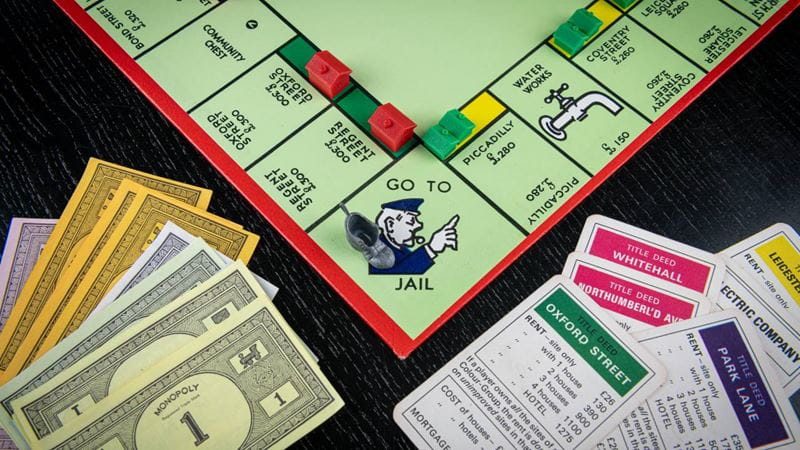
Whether you opt to race around London’s property hotspots, or one of the newer versions based on different towns and cities or even football clubs, youngsters aged eight and over will learn a load of money lessons from this classic board game.
Sarah Coles, head of personal finance at investment platform Hargreaves Lansdown, says Monopoly teaches valuable negotiation skills, and the risks of pushing too hard and coming away with nothing.
/the-game-of-life-game.jpg?sc=max&mw=800&h=450&la=en&h=731&w=1300&hash=83DEBA25292C391D061CD531D585FCAE)
In this book, children aged two to six enter a magical world where the currency is carrots. Save It is part of the four-book Moneybunny series by the same author, alongside Spend It, Earn it and Give It.
Available from WH Smith, Waterstones, Hewson Books, and independent booksellers
Author Will Rainey taught his daughters about money from a young age by adding a financial twist to traditional bedtime stories. In this book, aimed at six to 10-year-olds, he does the same, weaving the story of a 13-year-old girl and her wise grandfather with some gentle financial education.
Grandpa's Fortune Fables, £9.99 (paperback) from Amazon
Grandpa's Fortune Fables, £9.99 (paperback) from Waterstones
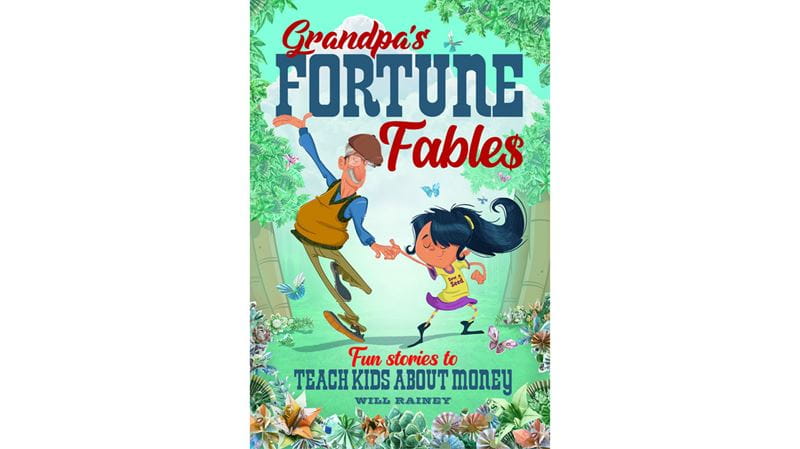
Winner of the 2004 CILIP Carnegie Medal and written by the current Waterstones Children’s Laureate, Frank Cottrell-Boyce, two brothers suddenly find themselves rich – but how do they spend the money in the few days before it becomes worthless? This book is aimed at children aged 9 to 11 and is still relevant 20 years on.
Available from Waterstones, currently £6.49
Recommended by the goodplayguide.com, this role-play curtain aimed at ages 3 plus will be a welcome gift in homes that are short on space – transforming a doorway into an instant play area.
Choose from a puppet theatre, shop or ice cream parlour, where children can put on a show or play shop. They’ll practice using play money and learn important math's skills while having heaps of fun.
Pop-Up Play town , £19.99 from very.co.uk
/the-game-of-life-game/shutterstock_2298991601-(1).jpg?sc=max&mw=800&h=450&la=en&h=731&w=1300&hash=A30351AFCBAA01896C0EE82FC89A57B6)
Cash was once king. But nowadays children are used to seeing payments made by the tap of a card, phone or watch. This toy cash register comes with a card reader, receipts, working calculator, bank notes and coins, helping young children make sense of an increasingly cashless world.
Casdon cash register, £25 from Casdon
Melissa and Doug toys are designed to encourage imaginative play. One of our favourites is the chocolate factory. Children aged three and up can make pretend chocolates with different fillings and toppings, which they can then display in a fancy gift box. Children can "pay" for the chocolates, or pay pretend suppliers, with play money. It's good for developing colour matching and counting skills as well as getting young children to start thinking about money.
Or the wooden vending machine is a winner in this year’s MadeForMums Toy Awards, although it's currently hard to get hold of. Children can fill the vending machine with the items included, or any others they find in your cupboards, then use the colour-coded coins to ‘buy’ things they’d like. You can also price the items and put real money in the slots, teaching youngsters how to add, subtract and understand the value of money.
Melissa & Doug Wooden Chocolate Factory Play Set, £59.99 from John Lewis
Melissa & Doug Wooden Vending Machine Play Set, £79.99 from John Lewis (Currently out of stock)
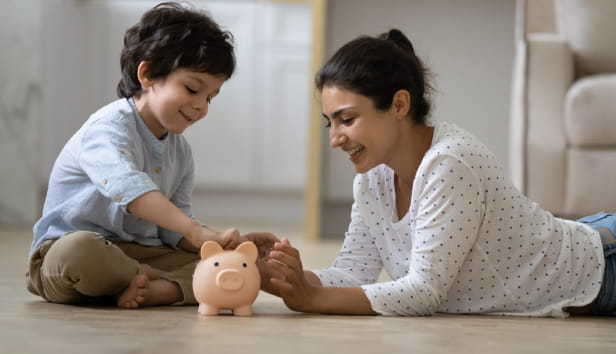
For a classic gift that can be treasured for years, this wooden piggy bank provides a simple, traditional way for children to understand the concept of saving. Simply drop the coins in and listen to them pile up. There is an easy-to-open hatch underneath for when you want to take the money out.
Vilac Pinky Pig Money Box, £28.50 from Hippychick
These colourful devices provide an easy way for children aged four to eight to keep track of any pocket money that their parents – or grandparents – have promised them, teaching valuable saving skills.
An investment junior ISA could be a good way of teaching children and teenagers about how the stock market works. You can invest or save for a child under 18 through a Junior ISA. A Junior ISA has to be opened by a child’s parent, but grandparents can pay into it.
Sarah Coles says grandchildren might not be terribly excited by a junior ISA on Christmas Day, but you can soften the blow by suggesting they invest in a company they have a connection with – like their favourite media or tech firm.
“Alternatively, opt for a company that focuses on delivering dividends, so it’s the gift that keeps on giving. Whatever you choose, it’s a powerful way to teach them about the rewards of long-term investment.”
A pre-paid card, typically for children aged 6-plus, works a bit like a pay-as-you-go phone, meaning children can’t spend more than they have on the card. It could give your grandchildren hands-on experience of handling money in an increasingly cashless world. Adults can monitor spending via an app, and also help children set saving challenges.
You could pay for the card’s subscription cost (if it has one), which can be as high as nearly £50 a year, or pay in money regularly. Pre-paid cards are offered by a range of banks and digital companies, including Starling Bank, Hyperjar, Natwest Rooster Money, Nimbl and GoHenry.
The Starling Kite children’s card is free, although you’ll need a Starling current account. The Revolut card is also free (apart from a £4.99 delivery charge) if you have a Revolut current account – but you can only set up one under-18s account. Natwest Rooster Money is free if you’re a Natwest, RBS or Ulster customer (or available with a monthly fee if you’re not).
Gift cards are a great way to help children manage their money, making them decide how best to spend that precious balance. You could take it one step further and buy them The Charity Shop Gift Card, which will help them make their money go further while doing good at the same time. Available online, as well as from stores including WHSmith, Sainsbury’s and many charity shops,
The Charity Shop Gift Card can be loaded with money and spent in around 2,000 stores, including Sense, Shelter, Crisis, Marie Curie, YMCA and Salvation Army.
/grandmother-and-grandfather-reading-to-their-granschildren/shutterstock_1267638358-(1).jpg?sc=max&mw=800&h=450&la=en&h=731&w=1300&hash=3A3C39693E2B4C20586C9CD2CA526AC6)
Mel is a freelance journalist who has been writing for national publications for 20 years. She has written for The Sun, Daily Telegraph, Daily Mail and the Daily Mirror, as well as magazines including Good Housekeeping, Prima, Red and Woman & Home.
Mel loves the variety of her work. One day she will be fighting for a reader’s consumer rights, the next interviewing a renowned author.

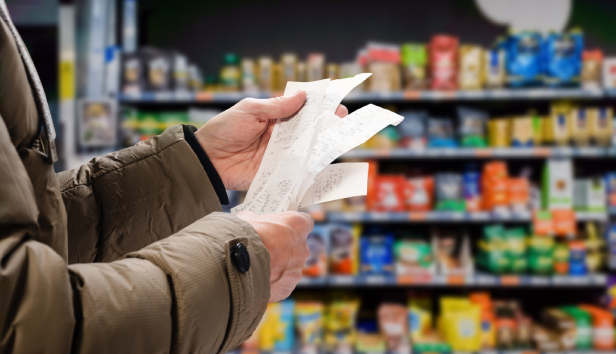
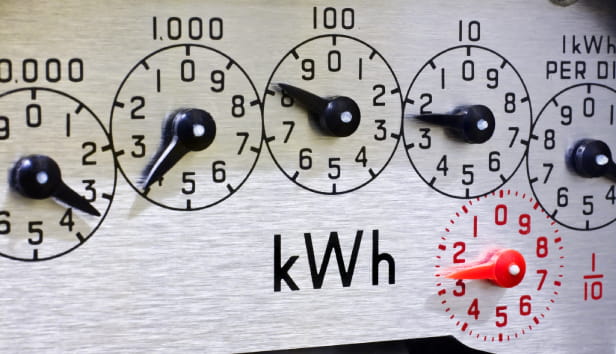

From their first savings account to their first home, find out how your gifts can make the biggest impact for your grandchildren

/mature-couple-looking-at-taxes.jpg?la=en&h=650&w=1400&hash=5CFABEEDC751F26D56DD3E85749E3C36)
.jpg?la=en&h=650&w=1440&hash=D2D232A61FCEAEBDC0D69D8AE38E8E41)
